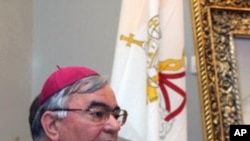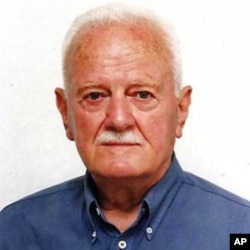A senior Roman Catholic cleric in the Holy Land says the Christian community is in danger of dying out in Nazareth, an Israeli Arab city where Christians believe Jesus spent his youth. Bishop Giacinto-Boulos Marcuzzo says many of Nazareth's minority Christians began emigrating more than a decade ago largely because of tensions with local Islamists who tried to build a mosque next to the city's main church. Israel terminated the mosque project in 2003 and Nazareth has been calm ever since. But, Bishop Marcuzzo says several threats remain to one of the region's oldest Christian communities, whose first church was built in the 5th century AD.
|
Listen to Michael Lipin’s interview with Susan Yackee:
|
Bishop Giacinto-Boulos Marcuzzo says the emigration of Christians from the Israeli Arab city of Nazareth is endangering the survival of the Christian community in a place of biblical importance to Christianity.
The bishop says the main cause of that emigration is a campaign by Islamists to boost their political power in Nazareth at the expense of Christians and moderate Muslims.
"Our problem is not religious, but it's the political situation of insecurity, of non-peace, of non-justice, of non-equality among the people," said Marcuzzo.
Tensions erupted in 1997 when Islamists set up a prayer tent near Nazareth's Basilica of the Annunciation, located where Christians believe an angel told Mary she would give birth to Jesus.
Nazareth photo gallery by Michael Lipin
The Islamists' goal was to establish a large, permanent mosque at the site, which houses a shrine to Shihab e-Din, a nephew of 12th century Muslim warrior Saladin. Christians in Nazareth and abroad objected, fearing such a mosque would block access to the Basilica and disrupt Christian services.
Christian leaders lobbied for the site to be developed into a plaza for tourists. That idea angered some Islamists, who rioted in Nazareth on Easter Sunday in 1999, smashing Christian-owned cars and shops.
"For us, that problem caused the reaction of many families who wanted to go away, because life became difficult here in Nazareth in those days, in those years," stated Marcuzzo.
Islamists built foundations for the mosque near the Basilica with approval from Israeli authorities, but local and international criticism of the project led Israel's government to scrap it in 2003.
Eight years later, an Islamist organization called Jama'at Ansar Allah, or the "Supporters of Allah," still conducts weekly outdoor prayers at the shrine. It also erected a large banner in the area with an English quote from the Koran. The message reads, "And whoever seeks a religion other than Islam, it will never be accepted of him, and in the Hereafter he will be one of the losers." Bishop Marcuzzo says displaying that sign in full view of Christian pilgrims is provocative and the church is trying to have it removed.
The bishop says Christian relations with majority Muslims improved in recent years with the help of dialogue and Pope Benedict's visit to Nazareth in 2009. But, he says the two communities are no longer as fraternal as they were in the early 1990s.
Nazareth Mayor Ramiz Jaraisy, a Christian, said the situation is back to normal in the city of 80,000 residents.
"Because of the very strong traditional relations between the populations of Nazareth - Christians and Muslims - we overcame that problem very soon, and the atmosphere in the city is very calm, very good, and from my point of view, excellent," explained Jaraisy.
In a city whose population is about one-third Christian and two-thirds Muslim, Jaraisy says voters have elected him three times because of his record rather than his Christian faith.
Jaraisy also says statistics show the current rate of emigration from Nazareth is "very low" for both Christians and Muslims, although he declined to provide a specific figure.
The mayor says religious disputes still have the potential to cause problems. But, he says such disputes threaten all residents of Nazareth, not just the Christian minority.
"When you have diversity, and you have different religions using religion to create tension, that is very, very bad for any community. That's the main danger and we're trying to face - any kind of using religion as a means to gain power, mainly political power," said Jaraisy.
One of Nazareth's most respected Muslim figures, the trustee of the White Mosque, says the failed campaign to build a mosque near the Basilica was led by a group of "irresponsible" Islamists. Atif al-Fahoum tells VOA that most Muslims and Christians in the city have refused to let prejudice ruin their society.
"This issue is history now, and I don't think there is a need to provoke it again. There are other issues at stake in the Arab world that deserve to be worked out more than this issue," noted al-Fahoum.
Al-Fahoum says the White Mosque, built in the late 18th century, always has worked for tolerance, including when it formerly served as a courthouse and administrative center for all of the city's residents. "The White Mosque is very much involved in the life of people. Many of the preachers deal with human relationships with the Christian communities and with the Jewish community in Nazareth. Many of them even talk about Christmas and Christianity. And you know, we all are the sons of Abraham. That means that we are brothers! We have to live together, we have to work together," said al-Fahoum.
Bishop Marcuzzo says the Church is working with local authorities to deal with other problems that cause Christians to emigrate: a lack of housing and jobs. He says the Church tries to provide land to Christians for building homes and helps them earn university degrees to become more employable.
The bishop says preserving the Christian community in Nazareth, other parts of Israel and the Palestinian territories is crucial for the future of the Christian faith.
"In the holy places of Christianity, of Jesus Christ, of the Apostles of the Church, we can't think about a holy land without a living Christian presence, besides a Jewish presence and a Muslim presence," said Marcuzzo.
But the bishop says the Church cannot prevent a demise of the Christian community on its own. He says Christians around the world must share in that mission.





